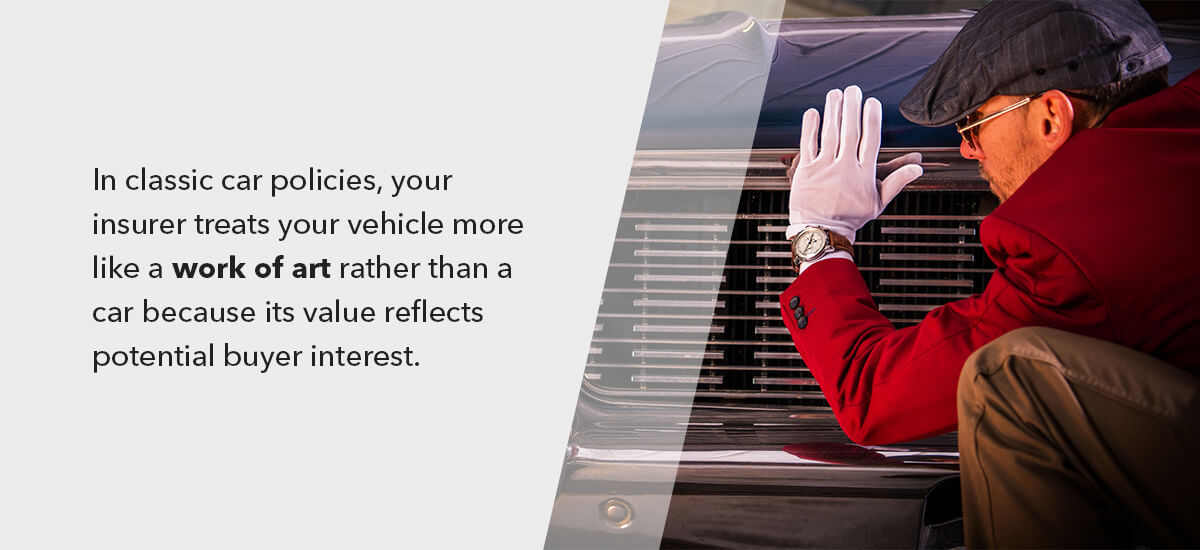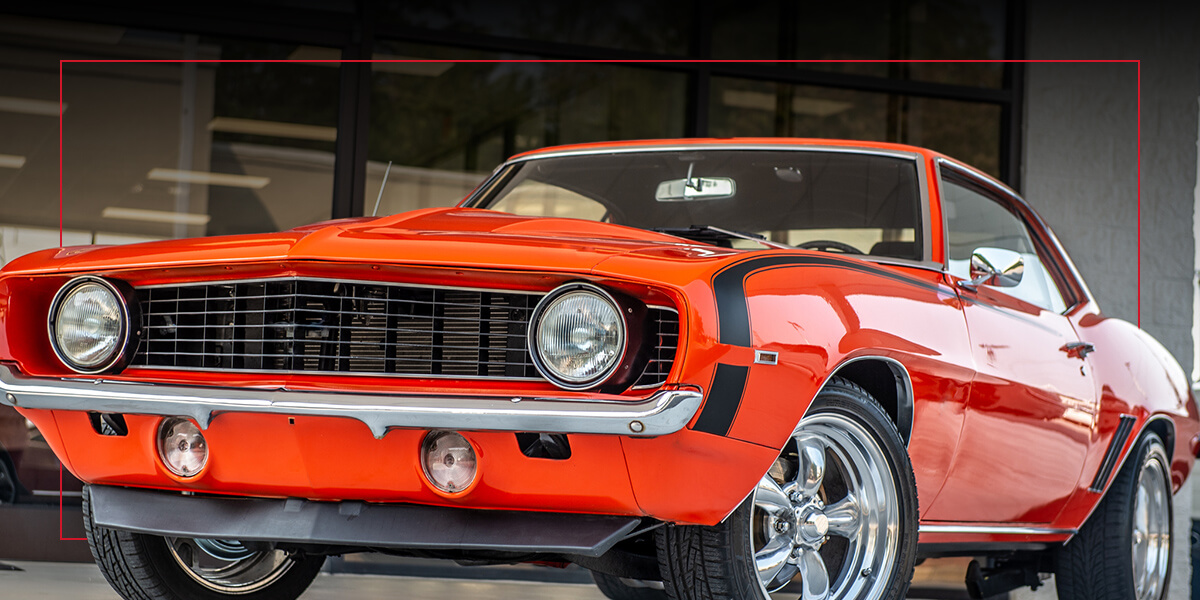The Complete Guide to Classic Car Insurance
Traditional auto insurance policies typically don’t offer sufficient coverage for classic vehicles. Classic car insurance policies provide specialized options and expert service to meet classic car needs, and you usually won’t find these coverage options from regular providers.
With classic car insurance, you’ll want to consider agreed value coverage — coverage you and your insurance provider agree on based on an appraisal of your vehicle. This feature is different from typical coverage because, as classic cars get older, their value increases. Some companies will also offer particular policies for showing your vehicle at car shows or repairing exotic vehicles, so you should always know what you need from your coverage before choosing a policy.
Classic car insurance isn’t limited, and various providers will offer different coverage options. Sometimes classic cars can encompass replicas and modern classics alongside antique pickup trucks and vintage muscle cars. Whether you’re a car collector, owner or enthusiast, understanding classic car insurance will help ensure your vehicle receives the most protection. Determine if you need insurance for your classic car and find tips on how to get it below.
What Is Classic Car Insurance?
Several features of classic car insurance separate it from standard insurance policies, with the most important aspect being agreed value coverage. In this policy, you and your insurer will settle on your vehicle’s value and how much to insure it for. This range can begin as low as $10,000 and span to $100,000 and beyond. An appraiser will determine your car’s worth, and you’ll work with your insurer to craft a fair policy.

This process differs from regular insurance because, for a traditional policy, your insurer will determine your car’s value based on repair costs and comparable models. In classic car policies, your insurer treats your vehicle more like a work of art rather than a car because its value reflects potential buyer interest.
Your maximum payout will not decrease over time as it would for a traditional policy. While regular cars will depreciate in value, your classic car will likely not, meaning your payout cannot decrease. However, you can adjust your policy as the value of your car increases to ensure you receive the payout you deserve.
What Is Considered a Classic Car for Insurance Purposes?
It’s a common misconception that every car older than a specific age can qualify for a classic car policy. Although it can affect eligibility, age isn’t everything and this will vary from company to company. The term “classic car” can encompass many different vehicles and you may need to contact multiple providers before finding one to insure your car.
You will need to restore older vehicles to qualify for classic insurance if the car is not in good condition, as condition plays a large part in vehicle eligibility. You should always look through various companies to find one with the best pricing structures to benefit you.
You can insure these vehicles under classic car insurance policies:
- Collector cars from earlier than 1980
- Antique farm vehicles
- Classic motorcycles
- Vintage cars from between 1919 and 1930
- Collectible models or limited edition vehicles
- Manufactured and modified street rods from earlier than 1949
- Classic military vehicles
If your car is less than 25 years old, but you have modified it to create a unique model or add value, it may qualify as a classic under some insurance companies. Cars newer than 15 years are considered “exotic” rather than classic. These cars can increase in value over time, but you might have difficulty trying to insure them with some policies.
Types of Classic Car Insurance
Your vehicle will determine which specific type of insurance you need. Classic car insurance encompasses historic, custom, antique and exotic cars. Some carriers will classify your vehicle differently and provide different benefits based on this classification. Here are some of the most common types of classic car insurance:
- Classic car insurance: Many companies define classic cars as those between 19 and 24 years old. These cars typically must be in good working condition and have a greater value than other vehicles with the same make and model year. Some companies may identify classic cars as those produced within a specific time period.
- Modified car insurance: If you’ve significantly altered your vehicle’s engine, chassis, interior or body from its original condition, your car may qualify for a modified car policy. Your modifications can positively or negatively impact your car’s value, and many providers will deny collectible insurance for these cars.
- Antique car insurance: Vehicles over 25 years old in original working condition or restored condition can qualify for antique care policies through many carriers. However, some companies require vehicles to be much older, with some carriers only considering cars more than 45 years old as antiques.
- Replicas or kit cars: These vehicles are typically over 24 years old. They usually have separate manufactured components or represent reproductions of motor vehicles more than 25 years old.
Some companies may have subcategories below these policies. Some carriers may offer additional options for veteran vehicles, modified street rods from before 1949, vintage cars, rare motorsport vehicles, antique tractors, classic motorcycles or vintage military vehicles.
Classic Car Insurance Eligibility

Your driving eligibility and car’s make and model will affect the policy you need. Depending on the company, the definition of a classic car can change.
Typically, classic car insurance doesn’t cover daily-use vehicles you use to drive to work, and many insurers require your vehicle to have some kind of unique feature. This could mean having an advanced age, a high value or some type of customization. Typically, your vehicle will need to satisfy one of these requirements:
- 25 years or older
- Exotic
- Modified vehicle
- Modern muscle car
On top of meeting these criteria, you may need to meet other conditions. Sometimes, you will need to meet all of these requirements to satisfy the insurance policy:
- You do not use the vehicle in races.
- The vehicle is in good condition.
- You do not use the car for daily commutes and travel.
- The vehicle remains parked in an approved structure such as a storage facility, carport or enclosed garage.
- You drive less than 7,500 miles every year in the car.
The mileage could change depending on the insurer. Some companies may allow you to drive the car more, while others may require that you drive substantially less than 7,500 miles.
Although your car may meet the requirements for a policy, your driving eligibility must also be up to insurer standards. Typically, you must meet the following conditions:
- Be at least 25 years of age
- Agree not to race your vehicle
- Have one or fewer at-fault moving violations or accidents within the last three years
- Have five to 10 years of driving experience and a good driving record
- Use and own another primary vehicle for frequent travel such as getting to work, school and other destinations.
You will likely not be able to insure your vehicle if its design is mainly for off-road use, has damage, is in poor mechanical condition or is dangerous to drive. However, every company is different, and you should always ask about your specific needs and requirements to verify if you can insure your vehicle.
What Coverage Does Classic Car Insurance Provide?

Typically, you can expect classic car insurance to offer coverage similar to traditional car insurance. You can expect the following under classic car coverage:
- Liability insurance: Under this coverage, your insurance company will pay for any injuries or damages you may have caused in an accident. Additionally, it will cover the cost of the legal defense if someone decides to sue you after an accident you caused. Most states require this coverage if you intend to drive your vehicle on public roads.
- Comprehensive insurance and collision coverage: Comprehensive insurance covers a wide range of issues, such as theft, animal collisions, vandalism, accident damage to your vehicle, flood, fire, hail or falling object damage, and riots.
- Uninsured motorist coverage: If someone without medical insurance crashes into you, this coverage will cover your medical bills. Some states require this insurance, and others cover car damage if an uninsured driver wrecks into you.
Beyond traditional coverage, classic car policies provide more options to choose from to ensure your car has the coverage it needs for any circumstance. You can sometimes tailor these options to fit your needs and get your vehicle the necessary protection. Classic car policies can offer these coverage types:
- Automobilia: Collectible items like vintage license plates, gas station displays, vehicle literature, hood ornaments and gas pumps can fall under this coverage.
- Cherished salvage: In the event that incidents like floods or accidents total your vehicle, this coverage will ensure you keep the right to have the salvaged car and can access your payout minus the deductible.
- Disabled vehicle: Some companies may include roadside assistance with this coverage, covering the cost of fuel or oil deliveries and towing services. Trip interruption assistance, meals and lodging can also fall under this coverage if you break down outside a specified distance from your home.
- Spare parts and automotive tools: You need to maintain your vehicle, or you might be restoring your classic car, and this option covers personal tools and spare parts. Some companies will cover spare parts even if you need them for a vehicle that is not on the policy.
- Vehicle under construction: Restoring a classic car is often necessary, but it’s an investment. This option will increase your coverage for specific periods so you can keep up the pace with restoration work.
Do You Need Insurance for Classic Cars?
Whether you need classic car insurance depends on your situation and what you hope to get out of your car. For example, you will need insurance if you plan to drive the vehicle on public roads. You should be aware of your state’s auto insurance requirements and assess your car’s personal needs and plans to determine the coverage you need.
Beyond state requirements, there are other reasons to seek classic car insurance. Working with a traditional car insurer means someone specialized in working with collector, rare or antique cars is handling your vehicle and its worth. These agents will better understand the ins and outs of your vehicle and can better deliver the protection it needs. These coverage options also have many benefits that make them desirable for many owners and drivers:
- Cash settlement options: If someone steals or totals your car, you can choose to take a cash payment without needing to use it to replace or repair your vehicle.
- Increased replacement cost: If your car’s value increases beyond the agreed value, the coverage will pay the difference so you can earn what you deserve.
- Spare parts coverage: Damage to or theft of spare parts like gears, valves, wheels and tires, or other parts doesn’t have to result in a monetary loss. This coverage option will pay for these parts as part of the accident.
- Roadside assistance: Transport your vehicle after a breakdown by using a towing service, which your provider will cover.
- No attendance required: Your insurance will provide coverage if you’re away from your vehicle because it’s at a show.
- Auto-show medical reimbursement: If someone gets injured during an event where you’re showing your car, your insurance will cover the bill.
Where to Get Classic Car Insurance and the Cost
Some of the best classic car insurance tips involve finding the most suitable option at a reasonable cost. Begin by looking for carriers that mainly serve classic car collectors, as they will better understand your vehicle’s value and the type of coverage you’ll need. You should always research the options available to you to determine the best fit for your car, but we have some other information that can cut costs and make classic car insurance more affordable.
Your classic car insurance should be less expensive than your traditional insurance. Because you’re driving your classic vehicle much less frequently, you have lower chances of being in an accident with that car. Additionally, this vehicle will rest in a safe and secure location and gain fewer miles every year than your everyday vehicle, making it more secure and less likely to encounter damage.
As far as cost goes, you will calculate classic car insurance similarly to your current auto insurance. Typically, classic car insurance will be less than half the cost of your typical car policy. You can expect this number to fluctuate by company, but you shouldn’t be paying more than you do for your current policy. Additionally, you may qualify for discounts if:
- You have multiple policies through the same company.
- You complete a defensive driving test.
- You don’t have any claims or accidents within the last few years.
- You have a clean driving record.
- You insure additional classic vehicles.
- You select a comprehensive policy.
- You equip your car with protections such as an anti-theft device.
Other protection equipment, such as airbags and driver assistance features, can also lower your monthly price because you’re making your classic vehicle safer to drive.
Check out the Top Flight Automotive Blog for More Information
Top Flight Automotive offers all your favorites under one wing. From performance to restoration, we offer the best apparel, gifts, accessories, interiors and parts for Camaros, Mustangs, Corvettes, Chargers, Challengers, Novas and many other makes and models.
If you’re looking for ways to protect and improve your classic car, you can discover tons of information on our blog. We cover modifications, performance enhancements, history and so much more. Check out our blog posts and discover how you can protect your classic car.












Leave a Response